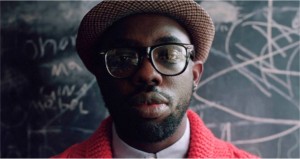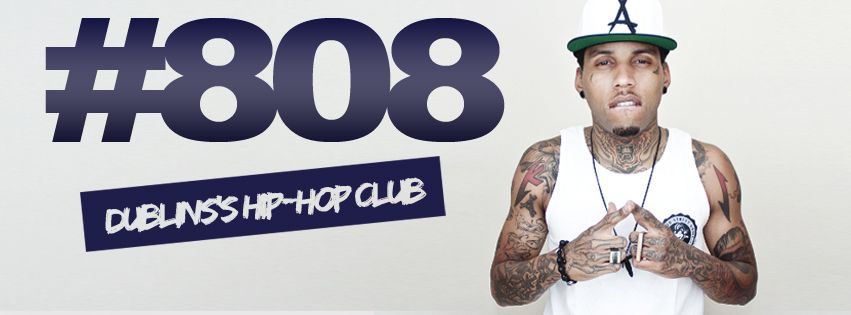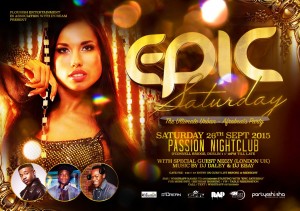 If the critics are anything to go by, then GHOSTPOET is a name you are going to be hearing alot in 2011. With a unique style that defies the normal stereotypes of Hip-Hop, GHOSTPOET is setting a new rhythm in the UK Hip-Hop/Electronica scene, and doing it in style. Currently touring across Europe, GHOSTPOET joined Rap Ireland‘s Kev Storrs, over a pint of Guinness in a Dublin pub, to chat about his life to date. Follow him @ghostpoet
If the critics are anything to go by, then GHOSTPOET is a name you are going to be hearing alot in 2011. With a unique style that defies the normal stereotypes of Hip-Hop, GHOSTPOET is setting a new rhythm in the UK Hip-Hop/Electronica scene, and doing it in style. Currently touring across Europe, GHOSTPOET joined Rap Ireland‘s Kev Storrs, over a pint of Guinness in a Dublin pub, to chat about his life to date. Follow him @ghostpoet
RI: Let’s Start with the name – where did that come from?
GP: Um. The name kinda came from a mixture of having an interest, a fixation, for a period of time, in ghosts and the paranormal. And the poet part kind of came from trying the differentiate myself from “rappers”, to have a different identity and not people seeing the name and instantly thinking one thing.
RI: Not to be stereotyped?
GP: Yeah exactly. I wanted it to be something to provoke conversation.
RI: Did that paranormal interest filter through to your music at all?
GP: Not so much. It was kind of a side interest when i was younger. It was one of those things in hindsight you maybe think wasn’t so cool, but at the time it seemed to fit.
RI: Did you get a chance to visit the ghost sites in Edinburgh while you were in Scotland?
GP: Nah I didn’t, we only got to see Glasgow. We were literally in and out and didn’t really get to explore at all. That was my first time in Scotland so that was fun. Really want to get to Edinburgh though.
RI: You live in Coventry?
GP: Yeah, I was born in London and grew up there. I went to Coventry when I was 18 for University, have a little house up there and it’s home now as well as London.
RI: I was interested in that because there must be a lot of parallels between Coventry and Dublin in terms of the Hip-Hop scene. Do you find it’s difficult living in Coventry making music, or do you need to be in the hub, in London?
GP: I think both areas have their good points and their bad points, their good attributes and their bad attributes. I mean, even though I have elements of Hip-Hop, I wouldn’t say I’m a straight Hip-Hop artist in the same kind of ilk as Skinnyman or mainstream rap. So living in Coventry was good because it gave me the space to really explore the kind of sound I was trying to produce. And London’s great because it’s the hub of everything creative, musically, and I would come down to London to be able to cultivate the ideas and network with people.
 RI: One of our homegrown artists, Maverick Sabre, has been doing well out in London – have you come across him?
RI: One of our homegrown artists, Maverick Sabre, has been doing well out in London – have you come across him?
GP: Yeah I played with him once a long time ago. He’s doing big things now!
RI: So tell us this. There are more artists out there now that ever before. Tens of thousands of rappers. A question I always ask myself is how these artists make the jump from being one of thousands to being one that thousands want to listen to and follow? I mean, how do you jump to the level where people are reaching out to you, rather than the artist emailing and emailing “Check me Out”, “Check me Out”?
GP: I think you got in a nutshell there. I mean I used to be like that, but like I was never really an “email email” person. I decided I was going to be really selfish and just focus on what I was doing and not worry about “trying to make it” or “getting somewhere” with it. I started doing what I wanted to do, making demos and building my own sound. And from that, that’s when people seemed to start recognizing that this guy is just trying to do his own thing. I guess from that it’s built to where I just was on my own, doing my thing and I don’t worry about anything. I didn’t start worrying about “Oh I want to get signed to a label”, then thinking “Oh what kind of label do I want to get signed to”, or would I need to change my sound to fit into that particulate label, or get my music to that particular DJ or whatever. I’d rather not do any of that, just be my own artist.
RI: And how do you find the industry has changed since you started out? I mean back then labels were king, but now you can do most of it yourself?
GP: Yeah I think labels still have a place. I guess it has diminished, depending on how much work you want to put in yourself. I really do like now that you can do a lot by yourself, do a lot on the social networks like Facebook or Twitter, Bandcamp, all the things that are there so the labels can see the following and the statistics on what I’m doing.
RI: So you become like a ready-made package?
GP: Yeah, Yeah. I think it’s important to do as much as you can yourself.
RI: But you still need that machine behind you for the marketing and distribution?
GP: Yeah exactly, you still need that. And you can do that yourself, but for me I would rather focus on my music and let the people who know that kind of thing do their thing.
RI: So just to touch on the music side of things for a minute – who would your early influences have been and how have they affected your music?
GP: Well, I wouldn’t say there were any particular artists or genre, it was more kind of really just trying to get through the life I was leading at the time and music was almost kind of like a soundtrack to that. It was all different styles of music; jungle, garage, drum and bass, electronica. It all came in at one stage of my life or another. So it’s just kind of like experiences of music along the same.
RI: And that can be seen in your music. So if someone who didn’t know you as an artist was to ask you to sum up your sound in a couple of sentences, how would you do that?
GP: I think the easiest way I would say is… Experimental.. electronic.. Hip-Hop.. maybe? (laughs) with a sprinkle of different things in it. It’s partly because I never purposely wanted to be “that” kind of artists, it’s just the influences of the music I was listening to. When I’m making something it’s not like I’m saying “I want to make a Hip-Hop tune”, I just want to make music. So I guess yeah, I’d describe it as something like that!
RI: I feel that a lot of labels and fans are looking for that individual sound today. How do you go about developing your own unique sound and differentiating yourself from the thousands of Lil Wayne and Young Jeezy replicas? I mean the UK seems to have gained a new confidence with using their natural accents but that’s not fully the case in Ireland – how did you develop your sound?
GP: Hmmm I mean it wasn’t like a deliberate thing, but I guess it does come naturally. It comes from listening and seeing the things around me, listening to Hip-Hop and listening to indie people like Badly Drawn Boy, Oasis and Razorlight etc. Taking elements from that and trying to construct something. And yeah would agree with you, the UK seems to have grown more confident and more open to being themselves it was when I started focusing on myself and being myself and not copying any other person, I guess how that sound developed.
RI: I interviewed Tim Westwood a few years back, this was before the new successful wave of the Tinie Tempahs and N-Dubz, and he said he felt Ireland was about 10 years behind the UK scene. What do you think were the turning points for the UK scene and what can Ireland learn from that to bridge the gap?
GP: Well I wouldn’t say I’m an expert, so I can only give you my opinion. I would say that it was embracing technology and the internet. And realizing you can get to people much quicker, get reactions much quicker. And you can test things out man, see what’s viable or not, seeing your feedback on where you’re going right, where you’re going wrong.
With the UK as well, there’s almost like a family culture. We’re all in it together and we’re all trying to go for the same thing. Be it a pop artist like Tinchy Stryder or be it an underground artist, we’re all trying to get exposure. It was really kind of having that grime mentality, not rebellion, but really let’s give it our hardest. And as long as something is good people will come to you and seek you out. Again, I’m not an expert, but if I was to give any advice it would definitely be true to yourself as much as possible.

RI: I used to find that with Hip-Hop Connection back in the day – there used to be that kind of family or comradery. Since that magazine disappeared has that changed at all?
GP: Not to me, I wouldn’t really know. I used to only read HHC a few times. I think because of the internet, and you can see this in magazine sales across the board, not just HHC, but I’ll quicker check a blog or go online for my news than a magazine. So I guess now people are just reading up on the internet and it’s become second nature now. If you want to find out about Hip-Hop you go online now, you don’t go to a newspaper as such.
RI: With so much “noise” on the internet, where every artist is on a level playing field, is it harder to have the same quality control on blogs and sites as there once was with magazines?
GP: I think it boils down to your approach. There are people who will blast email everyone in their address book, like, “Check this Out, Check this Out”, and most of the time bloggers will ignore them. You need to put yourself out there in a way that you’re showing what you do but it’s not intrusive. Though at the same time there needs to be enough information out there that if someone puts your name into Google they’ll come up with everything, website, Facebook, Twitter, Myspace, everything. Personally I react better to that than someone being like “Check me out, blah blah blah”
RI: You almost think there’s something wrong with them if they’re hounding you that much..
GP: Exactly, if you were that great I would already have known about you. So yeah, I think it’s the approach definitely.
RI: You seem to be building a fanbase across the UK and Ireland… How do you do that based in Coventry?
GP: Well I’ve been lucky that I’ve been supporting some tours and that has got me across the country. Again the internet has helped with that. I think people are recognizing that I’m an artist just trying to do my own thing. The only mission I have had is making music that people can relate to, so they can say I understand where he’s coming from, or I’ve been through that. I think people react well to that.
RI: Yeah even when we were in our teens it was the artists that we relate to that we put on a pedestal rather than the pop artists.
GP: That’s exactly it. And it’s not like I even want to be put on any pedestal, I just want to make music people can relate to. It’s strange because I had a gig in Poland a week ago and it was sold out, like 350 people, like in POLAND! Which is a blessing, but I guess it shows that people, no matter where they’re from, can connect with the music. Just talking about life in the lyrics and expressing the emotions of life. And you saying before that 100 people entered my competition on RapIreland.com, in Ireland, that’s.. wow.


RI: Kano jumped on the Cash & Carry Me Home remix.. How did that come about?
GP: I think it was his manager contacted my manager and said Kano really liked the track, and can he do 16 on it. I was like Ummmm… OK.. this is like one of my favorite MC’s.. what else am I going to say! So a couple of weeks back he came down to Red Bull studios and recorded his verse and I was amazed…
RI: I heard it yesterday, he kills the last verse!
GP: Yeah he’s such a versatile character. Having him on there gives it that extra exposure again..
RI: Would you consider re-releasing it with Kano on there?
GP: I think we’re giving this one away for free. So it’s a case of downloads and that. One of those mad things that happen!
Ghostpoet – Cash & Carry Me Home (feat. Kano) by ghostpoet
RI: Are there other artists you have ambitions of working with?
GP: Um, there’s a few people. For me any individuals with a similar mindset, who are about their music and not trying to do what everyone else is doing but going for something different. Whatever that is, wherever you are, I’m up for collaboration of some sort! So there’s a few people I guess, like Mike Skinner etc. There’s a few people! I’m up for collaborations, it’s what keeps things moving forward.
RI: We talked earlier about breaking through from completely unknown to the next level. Now that you would be considered a mid-level artist, how do you intend to make the next breakthrough, or do you want to?
GP: Not really (laughs), not really that bothered! I mean, I didn’t think about this level when I was on the level below. I just kind of did what I was doing. So just sticking to what I’m doing and if it so happens that I am “allowed” onto the next level then fair enough, I’m happy! Everything up to this point has been more than I ever expected, so what can I do, just keep doing it!
RI: So any last words to Rap Ireland listeners and readers? What can they expect from you in future?
GP: Yeah, well thank you for listening to this whole interview! Thank you very much! It’s just a blessing to be in Dublin, in Ireland. I’ve never been here before so to come over here through the power of music is great. Just look out for more mixtures, more collaborations and just more creativity!
WORDS // KEV STORRS // RAP IRELAND
Subscribe Below for Weekly Updates on Latest News & Events



